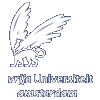Educational committments
Together with a number of collegues, I am participating in the following courses:
BSc courses
- Global Change (6 ECTS): First year BSc course providing insight into the changes that have occurred in the past and occur presently in our global environment. Topics inlude the structure of the atmosphere, weather and climate, changes in the atmosphere, lithosphere, hydrosphere and biosphereand mitigation efforts (Kyoto Protocol).
- Introduction to Hydrology (6 ECTS): BSc course dealing threaths to our water resources, rainfall generation and measurement, rainfall interception, evaporation, runoff generation and measurement, unsaturated zone hydrology, groundwater flow and hydrochemistry and water quality.
- Bachelors research project (17 ECTS): BSc students carry out a research project at the end of their three year study and write a BSc thesis.
MSc courses
- Catchment response analysis (6 ECTS): This course covers the
fields of surface water hydraulics, hydrological concepts of
hydrograph analysis, and catchment response modelling. The course
includes channel hydraulics (with emphasis on theory and application
of discharge measurement structures) and reservoir and river
routing. The modelling part covers the spectrum from classical
lumped models to distributed physically based models of various
kinds.
- Ecohydrology (6 ECTS): MSc course. The course describes basic
interactions between the land surface, atmosphere and
hydrosphere. Questions that are dealt with are: what determines the
broad vegetation patterns of the world, and how do these in term
determine the hydrological response of catchments. This course
provides understanding of primary hydrological processes of
vegetation (interception, transpiration, soil moisture) and
feedbacks of vegetation to the atmosphere. The course also contains
modules on micrometeorology, radiation and energy budgets, flux
measurements, interaction between vegetation and the atmosphere,
computer modelling (Python).
- Field instrumentation course in the Netherlands (3 ECTS):
During his intensive 10-day field course, students are instructed on
how to use hydrological, micrometeorological, geophysical, and
hydrochemical technigues and geographical information systems to
obtain a complete overview of the hydrology of an area.
- Field course Portugal (15 ECTS): This MSc course is held
in the North of Portugal (near Porto). Each group of students
instuments a catchment and studies ecohydrological and
hydrogeological patterns. Measurements include meteorological
variables, tree sap flow (transpiration), rainfall interception,
stream discharge, groundwater levels and flow patterns and
hydrochemistry. State-of-the-art sensor - datalogging equipment is
installed by the students and maintained during a four week
period. A geographical information system and GPS readings are used
to store and process spatial data.
- Hydrology Master's research project (27-39 ECTS): MSc
students have to carry out a four-six months research project. These
can be done in The Netherlands, but are frequently done outside the
Netherlands (Brazil, Costa Rica, Slovenia, Siberia, Indonesia,
Australia, etc.) in collaboration with our PhD students
Dr. M.J. Waterloo
VU University
De Boelelaan 1085
1081HV Amsterdam
The Netherlands
Phone: +31 20 5987319
e-mail: m.j.waterloo@vu.nl
Last modified: Fri Sep 21 13:44:29 CEST 2012







